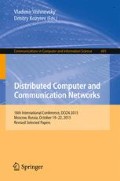Abstract
The definition of architecture fault-tolerant high-performance VLSI-based distributed computing systems is an important task and requires reasonable modeling at the design stage. One of the methods of generating faults and failures is the method of fault injection. The paper proposes a advanced fault injection technique, involving the use of determine the most likely negative externalities and the response of the system to them. This gives the possibility to determine the threat list, i.e. a list of elements, all of which were violated. In this article the concept of universal hardware-software complex FPGA-based prototyping to simulate the operation of the system and monitor of the device under test work correctness “on the fly”. This approach has more flexibility compared to the traditional and allows you to use more complex patterns in the modeling. It also allows simulation of operation fault-tolerant systems in terms of fault injection.
References
Panasyuk, M.I., Novikov, L.S.: Space model. In: The Impact of the Space Environment on Spacecraft Materials and Equipment, vol. 2, Moscow (2007)
Tylka, A.J., Adams Jr., J.H., Boberg, P.R., Brownstein, B., Dietrich, W.F., Flueckiger, E.O., Petersen, E.L., Shea, M.A., Smart, D.F., Smith, E.C.: CREME96: a revision of the cosmic ray effects on micro-electronics code. IEEE Trans. Nucl. Sci. 44(6), 2150–2160 (1997)
Gaffey, J., Bilitza, D.: NASA/National space science data center trapped radiation models. J. Spacecraft Rockets 31(2), 172 (1994)
Weller, R.A., Mendenhall, M.H., Reed, R.A., Schrimpf, R.D., Warren, K.M., Sierawski, B.D., Massengill, L.W.: Monte Carlo simulation of single event effects. IEEE Trans. Nucl. Sci. 57(4), 1726–1746 (2010)
Mendenhall, M.H., Weller, R.A.: A probability-conserving cross-section biasing mechanism for variance reduction in Monte Carlo particle transport calculations. Nucl. Instrum. Meth. A 667(1), 38–43 (2012). doi:10.1016/j.nima.2011.11.084
Barak, J.: Simple calculations of proton SEU cross sections from heavy ion cross sections. IEEE Trans. Nucl. Sci. 53(6), 3336–3342 (2006)
Acknowledgments
This research was conducted under Federal special-purpose program “Research and development on priority directions of scientific and technological complex of Russia in 2014–2020” under contract RFMEFI57715X0161.
Author information
Authors and Affiliations
Corresponding author
Editor information
Editors and Affiliations
Rights and permissions
Copyright information
© 2016 Springer International Publishing Switzerland
About this paper
Cite this paper
Brekhov, O., Klimenko, A., Kordover, K., Ratnikov, M. (2016). FPGA-Prototyping with Advanced Fault Injection Methodology for Tolerant Computing Systems Simulation. In: Vishnevsky, V., Kozyrev, D. (eds) Distributed Computer and Communication Networks. DCCN 2015. Communications in Computer and Information Science, vol 601. Springer, Cham. https://doi.org/10.1007/978-3-319-30843-2_22
Download citation
DOI: https://doi.org/10.1007/978-3-319-30843-2_22
Published:
Publisher Name: Springer, Cham
Print ISBN: 978-3-319-30842-5
Online ISBN: 978-3-319-30843-2
eBook Packages: Computer ScienceComputer Science (R0)

